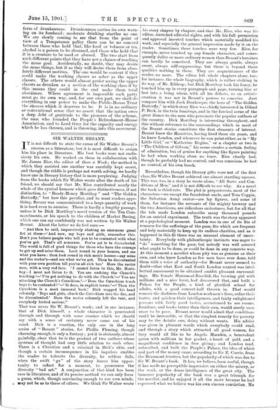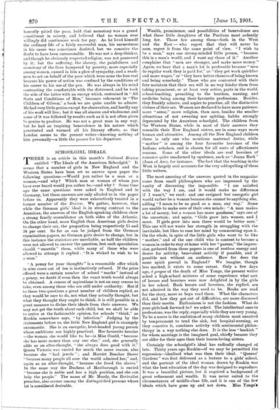SIR WALTER BES ANT.
TT is not difficult to state the cause of Sir Walter Besant's success as a litterateur, but it is most difficult to assign him his place in literature. His best books were not exclu- sively his own. He worked on them in collaboration with Mr. James Rice, the editor of Once a Week; the method iu which they assisted one another was carefully kept secret, and though the riddle is perhaps not worth solving, we hardly know one in literary history that is more perplexing. Judging from the books which Sir Walter wrote after the death of his friend, we should say that Mr. Rice contributed nearly the whole of the cynical humour which gave distinctiveness, if not distinction, to " Ready-Money Mortiboy " and " The Golden Butterfly," but how this peculiar, and to most readers appe- tising, flavour was communicated to a large quantity of work it is hard even to surmise. There is hardly a lengthy passage, unless it be Dick Mortiboy's novel version of the Ten Com- mandments, or his speech to the children of Market Basing, which one can say confidently was not written by Sir Walter Besant. About the latter we do feel sure And then he said, impressively shaking an enormous great fist at them= And now, my boys and girls, remember this. Don't you believe people who tell you to be contented with what you've got. That's all nonsense. You've got to be discontented. The world is full of good things for those who have the courage to get up and seize them. Look round in your houses, and see what you have : then look round in rich men's houses—say mine and the rector's—and see wbat we've got. Then be discontented with your own position till you're all rich too.' Here the rector rose, with a very red face. I cannot listen to this, Mr. Morti- boy —I must not listen to it. You are undoing the Church's teaching.'—' I've got nothing to do with the Church.'—' You are attacking the Church's Catechism.'—' Does the Catechism teach boys to be contented?'—' It does, in explicit terms.'—' Then the Catechism is a most immoral book.' Dick wagged his head solemnly. Boys and girls, chuck the Catechism into the fire, and be discontented.' Here the rector solemnly left the tent, and everybody looked serious."
That was never Sir W. Besant's work ; and in one instance, that of Dick himself, a whole character is penetrated through and through with some essence which we should say with a sense of certainty never came out of his mind. Dick is a creation, the only one in the long series of " Besant " stories, for Phillis Fleming, though charming enough, is only a fantasy ; yet it is obviously, almost painfully, clear that he is the product of two authors whose systems of thought had very little relation to each other. There is a Christian and a criminal in Dick's skin, and' though a certain inconsequence in his impulses enables the reader to tolerate the diversity, he seldom fails, when' the swift " go" of the story leaves him oppor- tunity to reflect for a moment, to pronounce the diversity " bad art." A conjunction of that kind has been rare in literature,'and of its precise method we can only form a guess, which, though convincing 'enough to our own minds, way not be so to those of others. We think Sir Walter wrote
his story chapter by chapter, and that Mr. Rice, who was his editor, stretched editorial rights, and with his full permission and approval inserted touches which materially modified his work, and especially the general impression made by it on the reader. Sometimes these touches were very few. Rice, for example, never touched up any female character, and conse- quently duller or more ordinary women than Besant's heroines can hardly be conceived. They are always gentle, always sweet, always self-suppressing, but there is beyond those qualities nothing in them. They are acquaintances of the reader, no more. The editor left whole chapters alone, too; for instance, the whole biography, which is rather striking in its way, of Mr. Eddrup ; but Dick Mortiboy took his fancy, he touched him up in every paragraph and page, turning him at last into a being whom, with all his defects, as an artistic creation it was not in Besant's powers to conceive. Just compare him with Jack Dunkerque, the hero of " The Golden Butterfly," in which story Rice was chiefly interested in Gilead .P. Beck, in the twin humbugs, and in the farcical scene of the great dinner to the men who personate the popular authors of the country. Dick Mortiboy is interesting throughout, and this without reference to the surroundings which in most of the Besant stories constitute the first elements of interest. Besant knew the Mauritius, having lived there six years, and he knew London, and whenever he can paint either, as in "My Little Girl," or " Katherine Regina," or a chapter or two in " The Children of Gibeon," his scene creates a certain feeling of admiration, but of genius for anything like figure painting he had when working alone no trace. Rice clearly had, though he probably had no control, and was conscious he had, no control, of his own brush.
Nevertheless, though his literary gifts were not of the first class, Sir Walter Besant achieved one almost startling success. This was. too, in a story he wrote alone, " All Sorts and Con- ditions of Men," and it is not difficult to see why. As a novel . the book is third-rate.. The plot is preposterous, most of the characters—we except the fraudulent uncle, and Tom Coppie, the Salvation. Army orator—are lay • figures, and some :of them, for instance the servants of the mighty brewery and the two Americans, are ridiculous caricatures, but for all that the tale made . London subscribe many thousand pounds for an untried experiment. The truth was the story appeared at a psychological moment. London was in one of its fits of remorse for the sufferings of the poor, fits which are frequent and help materially to keep up its endless charities, and as it happened in this fit there was an unusual element of uncer- tainty. Everybody with philanthropic instincts was eager to "do" something for the poor, but nobody was well assured what ought to be done, or could be done in any concrete way. At this moment a novelist whose pity was as genuine as their' own, and who knew London as few men have ever done, told them with a voice of authority—for Besant never seemed to doubt—that what East and South London wanted was intel- lectual amusement to be obtained amidst pleasant surround- ings. His female Haroun-al-Raschid, the brewing girl with millions and a nice lover, had discovered that, and built a Palace for the People, a kind of glorified school for adults, with a good concert-hall thrown in. That would remove the darkness from London workmen's lives, refine their tastes, and quicken their intelligences, and fairly enlightened p-rsons with fairly good tastes, accustomed to see rooms, furniture, and books better than their own, would surely soon: cease to be poor. Besant never would admit that conditions &mid be inexorable, or that the simplest remedy for poverty may be the Asiatic one, doing without wants. His advice was given in pleasant words which everybody could read,. and through a story which attracted all good women, for they would all like to be Angela Marsden, a benevolent queen with millions in her pocket, a heart of gold, and a magnificent confidence in free giving; and London read, subscribed, and built the People's Palace, the idea of which and part of the money came, according to Sir E. Currie, from the Beaumont trustees, but the popularity of which was due to Sir W. Besant's book. It has, we believe, been useful, though it has made no perceptible impression on either the misery, or the work, or the dense intelligenCe of the great city. The immense popularity of the book was a great triumph for the novelist, and he enjoyed it all the more because he had expressed what we believe was his own sincere conviction. He
honestly pitied the poor, held that monotony was a grand constituent in misery, and believed that no woman ever willingly did continuous work for pay. As he lived himself the ordinary life of a fairly successful man, his earnestness in his cause was sometimes doubted, but we conceive the doubt to have been unreasonable. He was not a deep thinker, and though he obviously respected religion, was not possessed by it; but the suffering, the slavery, the painfulness and monotony of the lives hampered by poverty, more especially among women, caused in him a glow of sympathy, and a readi- ness to act on behalf of the poor which were none the less real because his power of action was confined by the conditions of his career to his use of the pen. He was always in his mind contrasting the comfortable with the distressed, and he took the side of the latter with an energy which, restrained in All Sorts and Conditions of Men," becomes vehement in " The Children of Gibeon," a book we are quite unable to admire. He had very little genius except for observation, and hardly any of his work will live; but it was all sincere and wholesome, and some of it was followed by results such as it is not often given to genius to produce. He was not a great man in any way, but he had an inspiring benevolence in his nature which penetrated and warmed all his literary efforts, so that London seems to the present writer—knowing nothing of him personally—a little the poorer for his departure.











































 Previous page
Previous page